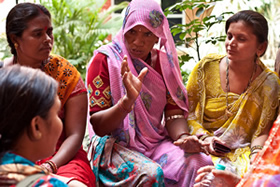Overview: Equal Participation of Rural Women in Decision-making
 |
| (Photo: UN Women/Gangajit Singh Chandok) |
Efforts to achieving the Millennium Development Goals will not be credible without the full and equal participation of rural women in decision-making. Enhancing rural women´s leadership and meaningful participation in all forms of decision-making, from Parliaments to local governments and civil organizations, will ensure more attention is paid to meeting the needs of women and girls. For most poor people, local governments are the most important political arena.
UNDP supports governments to establish institutional frameworks for the participation of the poorest and most marginalized women. UNDP also advocates for and promotes women's political empowerment, by helping to reform electoral processes, change political parties, and strengthen parliaments, judiciaries and the civil service. UNFPA uses participatory approaches and works with rural communities to eliminate socio-cultural constraints to women's participation in decision-making on issues of sexual and reproductive health and harmful practices such as Female Genital Mutilation/Cutting and child marriage. IFAD, through the use of quotas and capacity building, promotes and strengthens women's participation, both as members and leaders, of project-related decision making bodies as well as producer organizations. UN Women supports regular consultations between key partners such as Women's Parliamentary Group of East Timor and local elected women leaders to discuss issues and challenges facing rural women and how parliamentarians can work to progress rural women's agendas in Timor Leste.